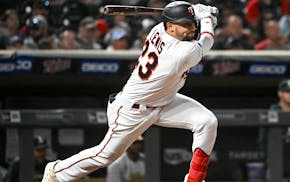NEW YORK – Yankee Stadium seems more like Yankee University this week, because the veterans in white uniforms are schooling the kids in gray. The Twins know the basics of winning games, of course, but they're getting a master's education in how the little details can make a big difference — in a game, and perhaps in a postseason race.
The Yankees, whose offense normally involves the use of rocket launchers, instead used a handful of spare parts — a couple of walks, a patch of slippery wet grass, an ill-timed error by a sure-handed defender, and for the second straight night, a wild pitch — to spitball together enough runs for CC Sabathia and the Yankees to walk away with a 5-2 victory.
"We were in traffic pretty much every inning," manager Paul Molitor said after his Twins lost for the fourth time in five days, and second big-game lull in a row on what soon could be a postseason stage. "There are some small margins for error."
He meant in the game, but it's tight in the standings, too. The Twins were fortunate the Angels lost 6-3 at home to Cleveland, keeping Los Angeles 1½ games back for the second AL wild card. In the "other" wild-card race, for home field in the one-game playoff, the Yankees have now all but locked it up; they lead the Twins by six games with 11 to play.
Little plays made the difference, and at first, it appeared the Twins would be the ones triggering them. After Brian Dozier led off the game with a first-pitch single, Joe Mauer and Jorge Polanco followed with perfectly placed bunts toward third base, both of them hits. Sabathia had reason to fear he was in for a night of them, given that he complained earlier this month that the Red Sox were "weak" for bunting against him.
But if they angered the range-challenged Sabathia, he channeled that rage like a veteran: By shutting down the Twins. He induced a double-play grounder from Eduardo Escobar that scored Dozier but snuffed the threat, and he rolled right on after that.
"I talked about it with these guys — it's not one of his strong suits, being able to cover that line. It's a good field for deadening the ball, it's a little wet on top of it," Molitor said. "Unfortunately we didn't see any more after that," and the failure to score more than one run grew more glaring as the night went on.
"We came out and put pressure on them. We got one, but that's all we got, and you know your opportunities are going to be limited," Molitor said. "You have to try to cash them in when you can."
Max Kepler did, lining a fastball into the second deck in the third inning, his first home run off a lefthander since July 5, 2016, and only his second extra-base hit off a lefty since April 15.
But Jose Berrios' command was absent, or at least shaky. He walked four, went deep into counts with nearly everyone and recorded only 10 outs on 90 pitches, though he gave up only three runs. The second run scored when Kepler slipped as he tried to throw Jacoby Ellsbury out at the plate, a residue of the wet weather that delayed the game's start by an hour.
Alan Busenitz relieved Berrios in the fourth inning with the score tied 2-2, and he retired both hitters he faced. But first, he threw a wild pitch that allowed Greg Bird to move from second to third base, putting him position to score the go-ahead run on an Aaron Judge fly ball.
A fourth New York run scored when Mauer couldn't handle a two-out, bases-loaded grounder to first in the fifth. The Twins then loaded the bases in the sixth but couldn't score, while the Yankees made it a three-run lead with three singles in the bottom of the inning.
"It catches your eye because he hasn't missed a ground ball all year," Molitor said of Mauer's error. "It took a funny kick. Joe kind of goes in that keep-the-ball-in-front mode with two outs, and most time he's so soft and absorbs it. But the ball kicked and he couldn't find it right away."
José Ramírez homers as Guardians continue scorching start with 4-1 win over Red Sox

